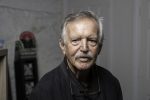Ex-P’ville Resident Writes Book on Surviving an Internment Camp
Many Americans have become increasingly aware that the internment camps held tens of thousands of people of Japanese ancestry during World War II.

William Reese Hamilton experienced more harsh conditions – across the Pacific Ocean.
As a young boy, Hamilton, his parents and two older brothers were among more than 3,000 Americans who were held for about three years at the Santo Tomas internment camp in Manila, comprised of mostly foreigners who had worked in the Far East prior to the outbreak of World War II and hailed from the countries that would fight against the Axis powers.
“I think we hear a lot about Japanese internment camps in the States because it’s our morals that are at stake but the Japanese never owned up to what they committed,” Hamilton said. “The level of brutality and cold-bloodedness, it’s unimaginable what they put people through.”
Hamilton, a former Pleasantville resident, has recently written a historical novel based on his experiences at Santo Tomas between the ages of 6 and 9 years old. On Monday evening, Hamilton will lead a discussion about his book, “Wonks,” at The Village Bookstore in Pleasantville from 7 to 8:30 p.m.
Born in Hollywood, Hamilton spent nearly all of his early years in Asia. His father worked for Citibank and was placed in Peking (now Beijing). After the attack on Pearl Harbor, the Chinese recommended that many of the country’s foreign workers, particularly Americans and the British, relocate to the Philippines. Hamilton and his family went to Manila.
But shortly after New Year’s 1942, the Japanese occupied Manila and transported aliens from enemy nations to the University of Santo Tomas, including Hamilton and his family. They were interned, with up to 50 prisoners crowding many of the school’s classrooms, he said.
Despite his youth, Hamilton remembers many of his experiences. Initially, there was optimism they wouldn’t be imprisoned for long but those hopes were quickly dashed with the Americans’ early defeats in the Pacific.
“There was belief we’d be rescued very quickly (but) after the fall of Corregidor and Bataan it was clear to everybody, we were going to be there a long time,” Hamilton said.
It turned out to be three years. The prisoners erected shanties and experienced deteriorating sanitary conditions. As the war dragged on and with Japan facing fierce battles, food became scarce.
“We were down to rice soup…with the quantity of about a slice of bread a day,” Hamilton recalled. “By the end of January before our liberation, we were losing up to five people a day due to starvation.”
Hamilton’s father wilted to 95 pounds and his mother was down to 85 pounds. The U.S. Army liberated the camp on Feb. 3, 1945, and they wouldn’t have been able to last much longer, he said.
In late March, the Americans put the former prisoners on military aircraft to bring them back to the United States.
“We got to San Francisco and I thought we had died and gone to heaven,” Hamilton said.
The family was then transported to Chicago and spent that summer at a relative’s farm in Vermont to complete their recuperation.
Although fraught with challenges, Hamilton said he had an easier time than his brothers transitioning back into school and a normal life. The family settled in Upper Saddle River, N.J. where he stayed through his high school graduation. Hamilton then joined the Army, serving in counterintelligence in Germany.
After his military service, Hamilton was a high school teacher in New Canaan, Conn. for seven years before embarking on a career in copywriting and advertising. He and his family lived on Bedford Road in the Old Village from 1980 to 2000.
In his later years, Hamilton has devoted himself to writing, with his work having been published in an assortment of periodicals.
He said he has been able to look back at those years in Santo Tomas as a source of inspiration. But not everyone was so fortunate. Hamilton remembered having friends who were orphaned; his brothers and parents were lucky to have survived as a family.
“It’s something you look back on,” he said. “It’s not a torment; it’s a base of courage. When times are tough you say ‘I remember when times were really tough.’”
“Wonks” is available at The Village Bookstore and at Amazon.com.

Martin has more than 30 years experience covering local news in Westchester and Putnam counties, including a frequent focus on zoning and planning issues. He has been editor-in-chief of The Examiner since its inception in 2007. Read more from Martin’s editor-author bio here. Read Martin’s archived work here: https://www.theexaminernews.com/author/martin-wilbur2007/
